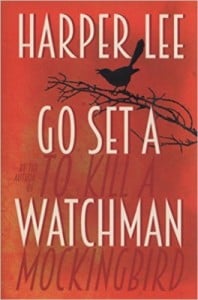Go Set A Watchman Review
August 13, 2015
Published in July 2015, Go Set a Watchman is Harper Lee’s sequel to To Kill a Mockingbird, published in 1960. Watchman is a first draft, to which Lee declined to make any alterations prior to its publication.
This novel was actually originally written before Mockingbird, but failed to attract industry interest at the time. Lee then wrote Mockingbird, set more than two decades earlier, and told from the first person point of view of the protagonist, Jean Louise (Scout) Finch, as a young child, growing up in the 1930’s in the fictional town of Maycomb, Alabama, with all its small town racial and class prejudice.

Go Set a Watchman
Go Set a Watchman follows Scout, now a woman in her twenties, on her return from her New York home back to visit her family in Maycomb. The novel’s title comes from Isaiah 21:6: “For thus hath the Lord said unto me, Go, set a watchman, let him declare what he seeth.”
It is Scout’s role to declare what she sees on her return to Maycomb.
The novel opens with Jean Louise returning to Maycomb, and paints an evocative and nostalgic picture of a landscape and community little changed on the face of it. As the reader, you are very much drawn in to the nostalgia from the onset, and there are some lovely descriptive passages and finely drawn characters whom you get to know well through their introduction to you as Scout meets them again.
It is a delight to be drawn further down memory lane with Jean Louise, back to her childhood days when she was Mockingbird’s Scout.
“She was silent. Time stopped, shifted, and went lazily into reverse. Somehow, then, it was always summer.” (p.54)
And there is young Scout, adventuring with Jem and Dill, a glimpse back to the well loved world of Mockingbird. These flashback passages occur at various points in the novel, and cast a different perspective on the events that are happening in the present.
There is the thread of a love story running through the book. Jean Louise has an ongoing on-off romance with Henry (the ‘Hank’ of their childhood). Henry, now a lawyer living and working in Maycomb with Atticus, wants to marry Jean Louise, but she is not sure, particularly later on in the book when he is revealed to be entrenched in racist opinion. There is something of a showdown between them and Jean Louise realises that there is no future for them as their views are too different. “Maycomb and Maycomb County had taught him things she had never known, and Maycomb had rendered her useless to him as anything other than his oldest friend.” (p.276)

Harper Lee – Author of To Kill a Mockingbird and Go Set a Watchman
In my opinion, Watchman is a much less likeable novel than Mockingbird. Very much looking forward to revisiting Maycomb and its much loved characters, Scout and Jem Finch and their lawyer father Atticus in particular, I found it largely disappointing and confusing, and some of the racist references, unremarkable at the time of writing, made for uncomfortable reading fifty years on.
It was quite shocking to discover that the moral hero of Mockingbird, Atticus, loved and vaunted for his liberalism and almost saintly exponent of justice and fairness, is presented to us in Watchman as a bigoted racist and exponent of the Ku Klux Klan.
The novel is centred on Scout’s coming to terms with the discovery that the values she believed her father held so dear, and upon which her own values have been based, are erroneous.
Aside from this, there is not much of a plot, and the third person narrative is often ponderous and preachy. Some lengthy, contrived conversations between Scout and her father and uncle outline the racial history of the time, in a text book dialogue style.
My overriding emotion, a bit like Scout’s, is one of loss. Atticus Finch is not who I thought he was after all. The idealism and simple innocence of Mockingbird is lost on becoming a reader of Watchman.
by Sophie Joelle
Filed under: Written & Spoken Word
Tagged with: 2015, author, book review, Go Set a Watchman, Harper Lee, literature, review, To Kill a Mockingbird, writing



Comments